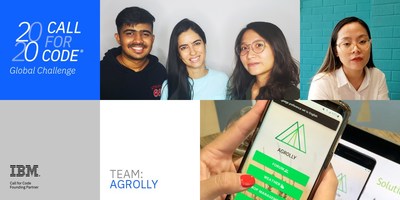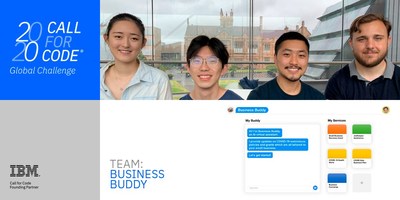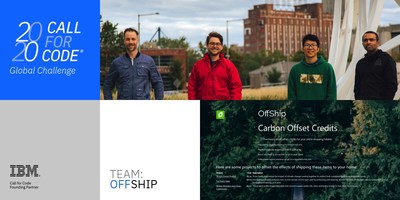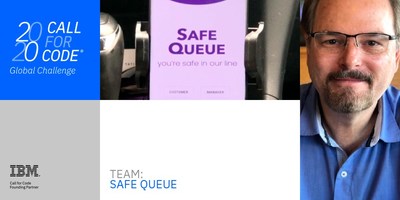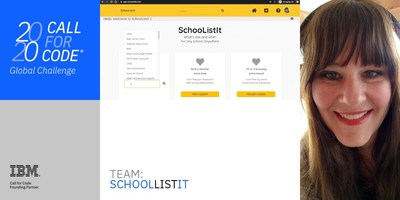All press releases
2020 Call for Code Global Challenge Finalists Selected for Innovative Solutions to Take on COVID-19 and Climate Change
ARMONK, N.Y., Sept. 28, 2020 /PRNewswire/ -- Call for Code Founding Partner IBM (NYSE: IBM) and Creator David Clark Cause today announced the top five worldwide finalists for the 2020 Call for Code Global Challenge. Call for Code unites hundreds of thousands of developers to create and deploy applications powered by open source technology that can tackle some of the world's biggest challenges. This year, developers around the globe were asked to create solutions to help communities fight back against climate change and COVID-19.
Now in its third year, the Call for Code global competition has generated more than fifteen thousand solutions built using a combination of open source-powered products and technologies, including Red Hat OpenShift, IBM Cloud, IBM Watson, IBM Blockchain, data from The Weather Company, and APIs from ecosystem partners like HERE Technologies and IntelePeer. Since its launch in 2018, this movement has grown to more than 400,000 developers and problem solvers across 179 nations, reflecting the reality that challenges like climate change and COVID-19 demand solutions that work on the local level, but also have the ability to scale and help any community, anywhere.
"This year of crisis underscores the need for the world's developers and business leaders to apply the power of hybrid cloud, AI and open source technology to address society's most pressing issues," said Bob Lord, Senior Vice President, Cognitive Applications, Blockchain, and Ecosystems, IBM. "For the third year in a row, the developer community has answered the Call for Code in overwhelming numbers, creating extraordinary solutions powered by open source technology. As a leader in open source with a long history of driving tech for good, it is incredibly gratifying for us at IBM to see how the broader tech community continues to come together, unified in purpose to make a tangible difference in the lives of so many."
Call for Code Global Top Five
These five finalists were chosen from an elite group of top solutions from each region of the world:
- Agrolly (Asia Pacific) - This solution was built by a distributed team of developers hailing from Brazil, India, Mongolia, and Taiwan, who met at Pace University. Agrolly is designed to support and connect small farmers around the world but particularly in emerging countries, where farms are suffering from reduced crop yields due to climate change. By combining weather forecasts with crop requirements published by the United Nations Food and Agriculture Organization, the platform provides tailored information for each farmer by location, crop type, and the stage of growth. The solution aims to fill information gaps so farmers can learn from one another, make more informed decisions, obtain financing, and improve their economic outcomes. Agrolly is currently available as an app in the Google store free of charge, and is powered by IBM Cloud Object Storage, IBM Watson Studio, and IBM Watson Assistant. VIDEO
- Business Buddy (Asia Pacific) - Created by a team of students in Australia at the University of Sydney, Business Buddy aims to provide a one-stop-shop that delivers personalized and responsive updates to small businesses to help them weather the financial impacts of COVID-19. Powered by IBM Watson Assistant, IBM Cloud Foundry, and IBM Cloudant, the solution helps determine businesses' eligibility for support from governmental programs, and guides them through the application process via an easy-access portal. VIDEO
- OffShip (North America) - OffShip was created by a team of developers in Canada from Morgan Stanley. OffShip is an easy-to-use browser plugin that educates consumers on the effect their online purchases have on the environment. It does this by providing an estimate of the carbon dioxide footprint of each purchase they consider which in turn helps them consider alternatives or purchase and donate carbon offset credits seamlessly. This solution is hosted in the IBM Cloud. VIDEO
- Safe Queue (North America) - Safe Queue, created by a single developer in Los Angeles, is a community-driven mobile app that is intended to replace physical lines at shopping centers, small businesses, and polling places with on-demand virtual lines, to support a safe way to manage entry during COVID-19. Safe Queue was recognized as part of Call for Code's accelerated COVID-19 track in May, and since then has been further developed, tested, and deployed with small businesses across the country. Safe Queue uses GPS location data to create a virtual queue of those within 1000 feet of a location, allowing employees to control the queue digitally, and validating entry with a randomly generated QR code for each customer. This solution builds on IBM Cloud Foundry for web app hosting, HERE technologies for geolocation, Twilio for SMS messaging, and IBM Cloudant to store data. VIDEO
- SchoolListIt (North America) - Created by a working mother of three children in North Carolina, SchoolListIt is designed to help families successfully manage schoolwork during the especially challenging circumstances surrounding COVID-19. SchoolListIt compiles information from the wide array of learning apps that teachers use, and makes it easy for students or guardians to understand at a glance what assignments are due and when, while also building a digital community for parents. The solution uses IBM Watson Text to Speech. VIDEO
Each year, the Call for Code Global Prize winner receives $200,000 and hands-on support from IBM, The Linux Foundation, and other partners to expand the open source community around their solution and to deploy their solution in areas of need. This year's grand prize winner will be selected by an elite group of judges, including some of the most eminent leaders in human rights, disaster risk reduction, business, and technology.
Path to Deployment
The IBM Service Corps and technical experts helped incubate and deploy the previous two Global Challenge winning solutions. Last year's Call for Code Global Challenge winning team, Prometeo, created a wearable device that measures carbon monoxide, smoke concentration, humidity, and temperature to monitor firefighter safety in real-time as well as to help improve their health outcomes in the long-term. The solution was incubated and completed its first wildfire field test earlier this year during a controlled burn with the Grups de Reforç d'Actuacions Forestals (GRAF) and the Grup d'Emergències Mèdiques (GEM) dels Bombers de la Generalitat de Catalunya near Barcelona, Spain. Prometeo was developed by a team comprising a veteran firefighter, an emergency medical nurse, and three developers.
Project Owl, the winning solution from Call for Code 2018, provides an offline communication infrastructure that gives first responders a simple interface for managing all aspects of a disaster. The physical "clusterduck" network is made of hubs that create a mesh network that can send speech-based communications using conversational systems to a central application. Together with the IBM Service Corps, Project Owl has been piloted across Puerto Rico, focusing on areas that were hit hard by hurricanes.
Both projects, as well as others, continue to be incubated through the Call for Code deployment pipeline.
Call for Code University Edition
This year, IBM partnered with the Clinton Global Initiative University (CGI U) to launch a dedicated University Edition within Call for Code. Together, IBM and CGI U reached more than 53,000 students around the world to help create solutions to fight COVID-19 and climate change. The 2020 Call for Code Challenge University finalists are: Kairos App (Latin America); Lupe (Europe); Pandemap (Asia Pacific); Plant-it (North America); and Rechargd (Asia Pacific). Solutions in the University Edition are competing for a grand prize of $10,000. The grand prize-winning team and runner-up will also receive the opportunity to interview for a potential role at IBM.
"This year, we launched the dedicated University Edition within the Call for Code Global Challenge so university students around the world could apply their learnings from the classroom, life experiences and imagination to tackling climate change and COVID-19 in sustainable, equitable and innovative ways," said Chelsea Clinton, Vice Chair, Clinton Foundation. "These finalist solutions are outstanding, and we look forward to announcing a winner on October 13th."
Growing Ecosystem
Call for Code's growth and success is a product of the unique ecosystem that IBM and David Clark Cause have convened to unite the technology development community with humanitarian organizations ensuring that solutions are robust, efficient, innovative, and easy-to-use. This community includes the United Nations Human Rights Office, The Linux Foundation, United Nations Office for Disaster Risk Reduction, Clinton Foundation and Clinton Global Initiative University, Cloud Native Computing Foundation, Verizon, Persistent Systems, Arrow Electronics, HERE Technologies, Ingram Micro, IntelePeer, Consumer Technology Association Foundation, World Bank, Caribbean Girls Hack, Kode With Klossy, World Institute on Disability, and many more.
"We are facing a time of unprecedented crisis," said Laurent Sauveur, Chief, External Relations, UN Human Rights "While the COVID-19 pandemic puts lives and livelihoods at immediate risk, climate change is an existential threat for humanity. By triggering global engagement, initiatives like Call for Code open up the potential for developers and problem solvers around the world to put their skills to use to create inclusive and effective response solutions that can be deployed quickly yet have long-term impact."
The grand prize and University Edition winners will be announced on October 13 via a digital event, the 2020 Call for Code Awards: A Global Celebration of Tech for Good.
About Call for Code Global Challenge
Developers have revolutionized the way people live and interact with virtually everyone and everything. Where most people see challenges, developers see possibilities. That's why David Clark Cause created Call for Code in 2018, and launched it alongside Founding Partner IBM and their partner UN Human rights. This five-year, $30 million global initiative is a rallying cry to developers to use their mastery of the latest technologies to drive positive and long-lasting change across the world through code. Call for Code global winning solutions are further developed, incubated, and deployed as sustainable open source projects to ensure they can drive positive change.
MEDIA CONTACTS
Deirdre Leahy
deirdre.leahy@ibm.com
845.863.4552
Chris Blake
blakechr@us.ibm.com
415.613.1120
SOURCE IBM

